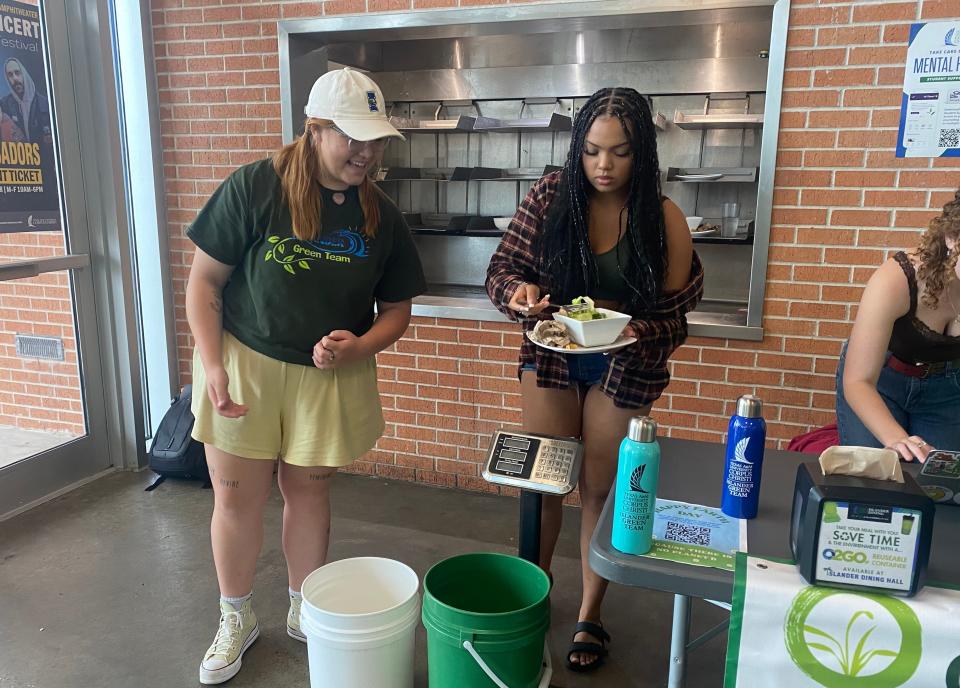Texas A&M University-Corpus Christi students tackle food waste for Earth Day
The Islander Dining Hall recycles and uses reusable tableware. The Texas A&M University-Corpus Christi dining hall doesn't use Styrofoam or plastic bags, and take-out utensils and paper straws are provided only by request.
This Earth Day, the Islander Green Team had its eye on another sustainability goal — food waste.
The student group, which receives university support and funding, held a food waste audit Monday during lunch. Stationed by the exits, team members grabbed plates from diners who were done eating, stopping to separate and weigh waste headed for the landfill or compost.

The team plans to share the data, as well as the results of a survey on food waste, with the university to help inform sustainability plans. The dining hall was designated an "Ocean Friendly Restaurant" in 2019 by the Surfrider Foundation.
"We're doing this to keep up with that standard and to make sure that we're doing all that we can to keep our dining hall as sustainable as possible," Islander Green Team president Taylor Thorpe said.
This week, the students are also hosting a series of events to celebrate Earth Day.
"Earth Day to me means bringing the community together and rallying for this cause that will affect all of us," Thorpe said. "My generation, we want to make sure that our kids are going to have a beautiful area to come live at in 20-30 years."
On Tuesday, the group is holding a bottle-bricking class. They have a clothing swap planned for Wednesday.
"Textile waste is second in line to food waste for U.S. overconsumption," Thorpe said.
On Thursday, they plan to make arts and crafts with recycled materials. On Friday, they have a beach clean and bonfire planned.
The Environmental Protection Agency estimates that in 2019, 66 million tons of wasted food was generated in the U.S. in the food retail, food service and residential sectors, with about 60% ending up in landfills. Waste was also generated in the food and beverage manufacturing and processing sectors, according to the 2019 Wasted Food Report.
"Food waste is a huge, huge, huge environmental issue, especially in the United States," Thorpe said. "We tend to consume a lot more than we're able to sustainably use. We are trying our best to reduce that here in our community."
The Islander Green Team uses a five-step composting process, mixing fruit and vegetable scraps with mulch and sifting through the waste every two weeks until the waste breaks down into usable soil for campus gardens.
"Every week we collect compost from the dining hall and Starbucks and the little cafes," Thorpe said.
Over the course of the year, the team also spreads awareness about environmental issues, collect compost from around campus and tend gardens. They host beach clean-ups and clothing swaps.
Junior Julia Stinson is involved with the green team's zero waste initiative.
"We're trying to find ways that we can implement sustainability into students' lives," Stinson said.
Stinson said there are small ways students can contribute to a more sustainable campus, by taking smaller portions at meals if they are throwing away food often. There are also ways the university can encourage this behavior Stinson said, such as by serving buffet-style meals with plates without trays or by limiting plastic bags at the bookstore.
"We all have backpacks," Stinson said. "Plastic isn't maybe necessary all the time."
Bottle-bricking is a practice where participants fill plastic waste containers with densely-packed plastic, creating an ecobrick. The trash is gathered and contained instead of making its way into the oceans, Thorpe said.
Stinson said that she was surprised to see the amount of plastic she was using when she started making an eco-brick.
"By the end of one afternoon, I had filled it up like a fourth of way without packing it down and I was absolutely shocked because I try to use Tupperware and avoid single-use plastics, but they are all around us," Stinson said.
Across campus, there are many sustainability initiatives, Thorpe said. In addition to the green team's activities, there are hydration stations around campus for reusable water bottles.
Thorpe, who is from San Antonio, studies environmental science and is set to graduate in May. A&M-Corpus Christi was the only university she considered, Thorpe said.
"There's always room to improve, but I do think the university does a great job focusing on sustainability," Thorpe said. "We're right here by the water, so it's very important to protect our coasts and our ocean and to make sure that we are doing all that we can to keep Corpus beautiful for all the years to come."
Community efforts to fund teachers, students growing in Coastal Bend
Women in industry share opportunities with high school students
See which Texas colleges Nueces County and Corpus Christi students choose
This article originally appeared on Corpus Christi Caller Times: Islander Green Team tackles sustainability at A&M-Corpus Christi
